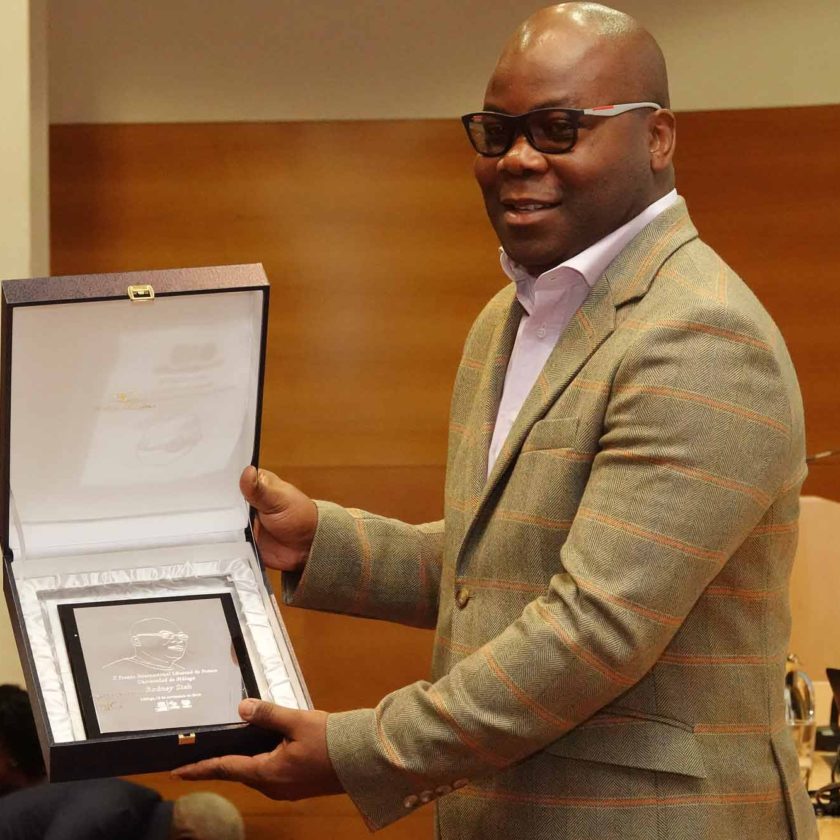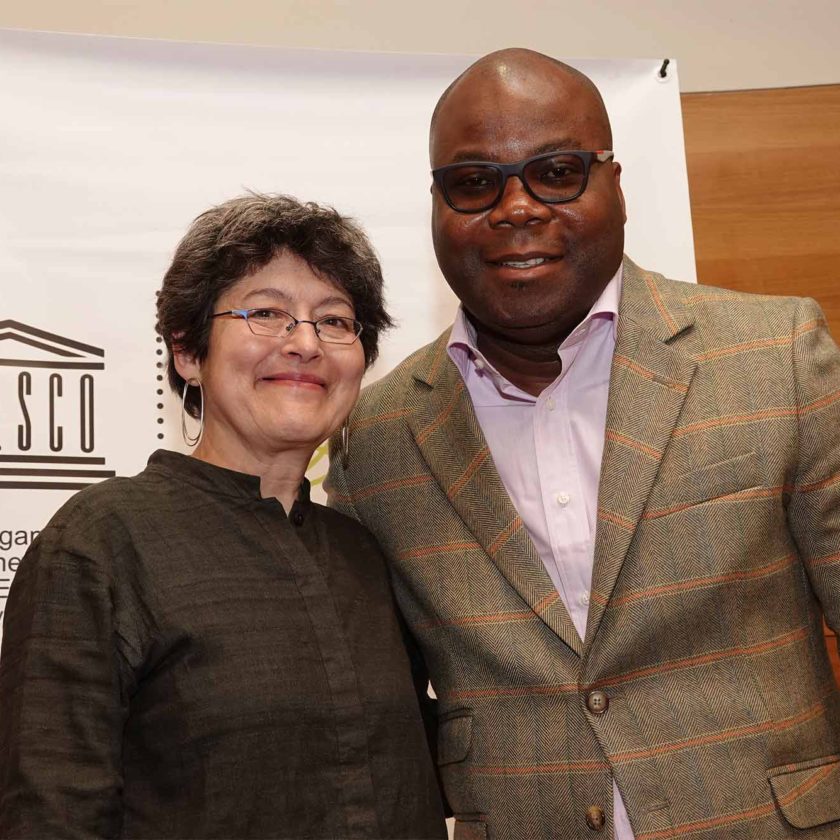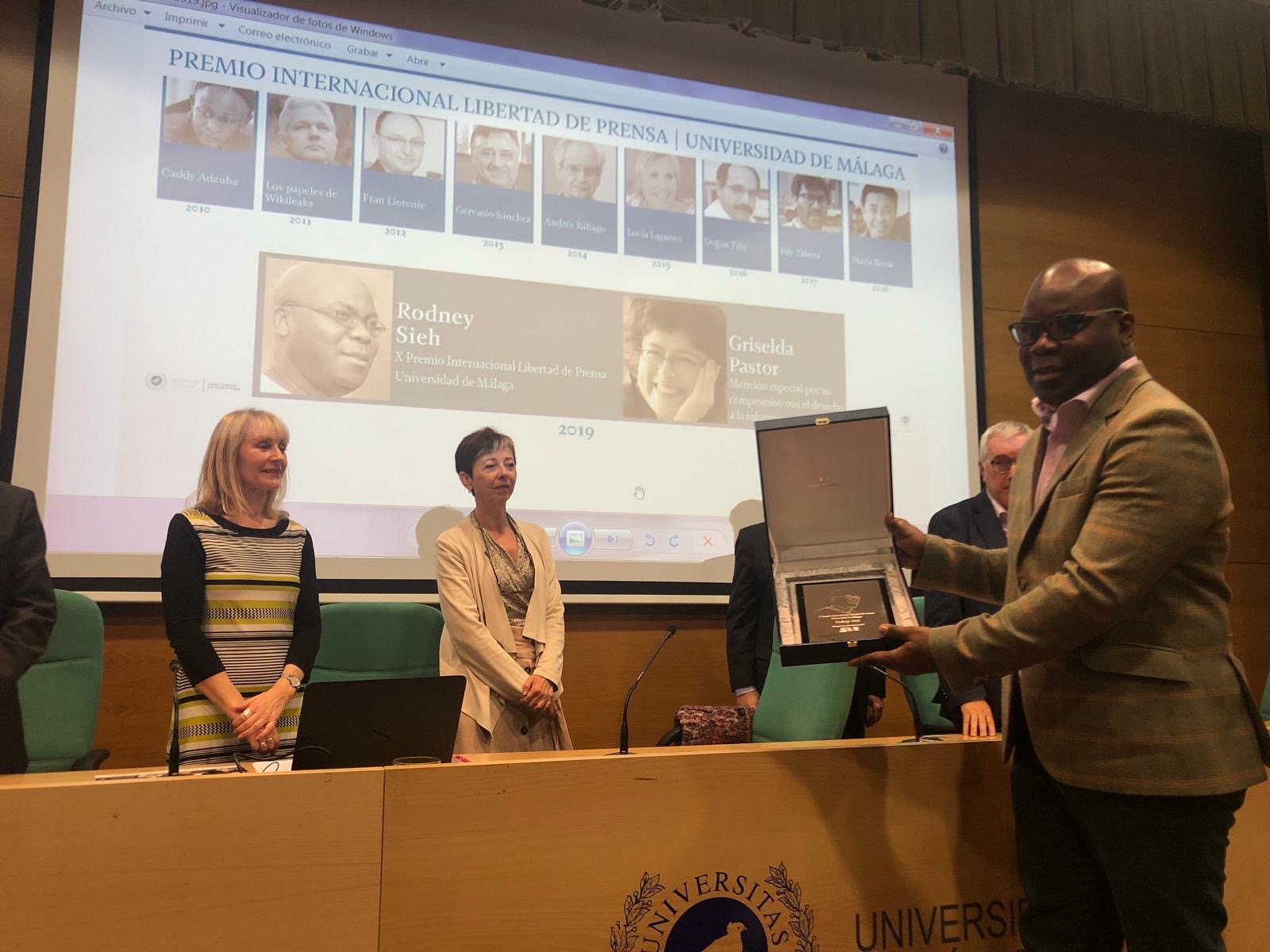The Publisher and Editor of one of Liberia’s leading dailies, FrontpageAfrica, Mr. Rodney Sieh has become the latest winner of the X-International Press Fredom Prize in Malaga, Spain.
This outstanding Liberian Journalist received the International Press Freedom Award 2019, presented on Tuesday, November 12, 2019 at the Rectorate of the University of Malaga.
In his acceptance speech, Mr. Sieh said: “My work follows a long line of patriarchs in my family that have been the source of my inspiration and my motivation.”
While paying tribute to his staff at FrontpageAfrica, the Liberian newspaper Publisher credited his passion and inspiration for Journalism to his late uncle Albert Porte and the current head of the Daily Observer newspaper in Monrovia, Mr. Kenneth Y. Best.
“My great and famous – uncle Albert Porte, was a political journalist and dissident who was the editor of the Crozerville Observer. In 1946, he became the first Liberian journalist to be imprisoned by President William V.S. Tubman. Although civil society existed in Liberia even upon its independence in 1847, much of our freedoms were suppressed. My Uncle Albert Porte was among the early figures in the movement toward a more civil society, and much of the early fight can be traced back to his activities.
My uncle Kenneth Best also had to endure the same. And I have been blessed with the opportunity to carry on the baton to the next generation of journalists.”
BELOW IS FULL TEXT OF RODNEY’S SPEECH AT TUESDAY’S AWARD CEREMONY:

X-INTERNATIONAL PRESS FREEDOM PRIZE
SPEECH DELIVERED BY RODNEY D. SIEH, EDITOR/PUBLISHER, FRONTPAGEAFRICA NEWSPAPER

Let me first extend my appreciation to the University of Malaga, the UNESCO Chair of Communication and the Board of Association of Degrees of Communication, Information of Spain; Stefanie Pukallus and Jackie Harrison from the University of Sheffield for the recognition and allowing me the space to share my book, Journalist on Trial with the student community during International Journalism Week last year – Thanks for being here today.
The Committee to Protect Journalists, Reporters Without Borders, the Canada-based Journalists for Human Rights, the Press Union of Liberia and Civil Society Groups; Prue Clarke and the New Narratives, and all international organizations that continue to highlight the work we do, this award is for you.
To the journalists at FrontPageAfrica, who have stood with me through some trying times, this is for you.
To our supporters, critics, detractors and oppressors, thanks for motivating us to do better.
If you were to google me right now, you would probably
assume that I am a criminal. Although I’m not, but the system and an age-old
law which criminalizes free speech and labels journalists as criminals, says I
am.
In 2013, I was sentenced to 5,000 years in prison and jailed because I could not
pay a $1.5 million fine for a libel lawsuit won by a former agriculture
minister accused of corruption based on an investigative report we uncovered.
As a young man growing up in Monrovia, I witnessed first-
hand the mass oppression, the brutal dictator Samuel Doe; so effectively
imposed upon his people.
My work follows a long line of patriarchs in my family that have been the
source of my inspiration and my motivation.
My great and famous – uncle Albert Porte, was a political journalist and dissident who was the editor of the Crozerville Observer. In 1946, he became the first Liberian journalist to be imprisoned by President William V.S. Tubman. Although civil society existed in Liberia even upon its independence in 1847, much of our freedoms were suppressed. My Uncle Albert Porte was among the early figures in the movement toward a more civil society, and much of the early fight can be traced back to his activities.
My uncle Kenneth Best also had to endure the same. And I
have been blessed with the opportunity to carry on the baton to the next
generation of journalists.
Because of my 5,000-year prison sentenced in 2013, I often have to look over my
shoulders when applying for visas – unsure whether a visa counselor would make
inquiries about my now, infamous criminality.
It happened a couple of years ago when I applied for a visa to undergo a
one-year Journalism fellowship in Toronto, Canada.
I arrived later than the rest of the other fellows because I had to prove to
the visa counselor that I was not what his google search said I was – an
indicted criminal. But rather a journalist sentenced to 5,000 years in prison
for simply doing my work. It took the intervention of a member of parliament,
Mr. Ahmed Hussein, now Minister of Immigration and Refugees and Citizenship to
intervene on my behalf before the visa was granted.
It is a rather strange claim to infamy I have been carrying since my conviction
and sentence to 5,000 years in prison. However, it is a badge of dishonor I aim
to fight for the rest of my life.
I’ve been jailed for journalism – twice, I’ve had arsonists attempt to burn
down my offices, I’ve had multiple threats on my life, my reporters have been
jailed, and my newspaper shut down – all because of my job description.
This is why I am glad to be here today and stand before you
as the proud recipient of the 10th X International Press Freedom Prize.
You see, my conviction and sentencing in 2013 is becoming more and more
familiar with each passing day and every passing hour.
Thanks to US President Donald Trump who has demonized our work, more and more
leaders and rulers across the continent of Africa – and even the world – have
adopted what is now the ring tune against the media, dubbed, trumpeted and
packaged as “fake news”.
Nowadays, investigating the corrupt, probing into bad governance of rulers and
leaders are being branded as fake news and those who report them as criminals,
when in fact, we are simply journalists doing our jobs.
Today, journalists in Africa are undergoing immense pain and suffering for
writing against the ills of society and those languishing at the bottom of the
economic ladder.
From Ethiopia to Nigeria, Cameroun to Rwanda, Sierra Leone, Congo, Burundi, Chad, Uganda and elsewhere, Journalists are being accused daily of criminal defamation – or forced to self-sensor themselves just to toe the lines of bad governance – and their perpetrators, bad rulers.
Whether it is covering a football match – or simply taking a photograph at a protest against the government, we are often targets of ruling establishments determined to keep the truth of their evil deeds hidden from the world.
In September, Erick Kabendera, a Tanzanian journalist was arrested after criticizing the president.
At first, the government raised issues about his citizenship. Later, the charges were changed – and he was accused of sedition, money laundering, and organized crime.
Organized crime because he wrote an article in The Economist, in which he said President John Magufuli was “bulldozing” Tanzania’s freedom.
A month later, in Burundi, four journalists and their driver were arrested on October 22nd, while on a reporting trip to Bubanza Province for the Iwacu newspaper. Those journalists and their driver are still languishing in jail facing anti-state charges. This is an outrage!!!
The journalists had informed authorities of their plan to travel to the area to report on an outbreak in fighting between Burundian security forces and a group of assailants. But a police chief of operations arrested them while they were doing their jobs.
Just last week, in Uganda, the police and the military, while cracking down on student protests over fee increases at Makerere University in Kampala, arrested journalists and prevented them from entering the university to cover the protests.
In Cameroon, journalists are under threats for their lives and accused daily by the government of being unpatriotic because they refuse to sing the praises of bad leadership and toe the lines of sycophancy.
Television reporter Samuel Wazizi was arrested for allegedly supporting separatist fighters in Cameroon’s English-speaking north, west, and southwest regions.
Today, it is very dangerous to be a journalist in Cameroun where it is becoming impossible to practice the profession amid increased threats from both separatist fighters and the government.
In Rwanda, which endured years of war and genocide between the Hutus and Tutsis, journalists are strongly inclined to self-censor just to avoid creating conflict or fear amongst the general public or falling afoul of government restrictions.
Under Paul Kagame, journalists can report freely about corruption and other misdeeds – as long as those misdeeds do not involve the presidency.
Under the law, journalists are forbidden to criticize the president; So, they self-censor when it comes to publishing anything critical of the country’s security or military. These laws, although counter to press freedom, which is guaranteed in the Rwanda’s constitution, continue to linger, keeping scores of journalists at bay – and under a state of fear and paranoia.
In my own country, Liberia, some of my colleagues are still paying the price. Roots FM owned by my colleague Henry Costa was shut down recently and his transmitters and broadcast equipment taken away. When the judge handling the case ruled that the government was wrong to shut down the station, the judge was removed.
Patrick Honnah, another one of my colleagues was told he could not come on the air with his new Punch FM Radio Station even though he had filed all the paperwork and granted license to operate. Both men with powerful voices, like me, have found themselves on the wrong side of right in what is supposed to be a democratic nation.
What all these cases have in common is a sudden urge by governments to prosecute, maim and criminalize journalists and media practitioners for doing their jobs.
Highlighting the issues affecting the poor and neglected have suddenly become unbearable for those at the helm of power.
You see, as a journalist working under the regimes of several West African despots, including convicted war criminal Charles Taylor and the recently-ousted Yahya Jammeh of The Gambia, I know first-hand how authoritarian leaders bully and undermine the media in order to win people’s support for their agenda. And I also know, that it is a slippery slope indeed that runs from the suppression of media freedom to chaos.
Across the continent, Scores of my colleagues have been
killed, maimed, persecuted, and jailed; many others live under a constant cloud
of threats. Fear permeates our work environment. Others live in exile,
separated from their families and friends, and disconnected from the lives they
had lived, the history that had given them a sense of place.
If the world is going to change, if people’s lives are going to change, we must
do better and must respect the work of journalists.
Not doing so is simply a recipe for neglect, suffering and pain of the
voiceless few lacking the platform to tell their stories.
Being jailed twice for doing my job has prompted the Press Union of Liberia to push for a repeal of the Penal Law of 1978, in the national legislature. This draconian law impedes freedom of speech with criminal libel against the President, Sedition and Criminal Malevolence.
I hope and pray that this is the beginning of change and I appeal to our President George Weah to make this a legacy project of his presidency.
The truth of the matter is, as much as a growing wave of dictatorship and criminalization of journalists are being trumpeted by a sitting US President and adopted by leaders across the continent of Africa, the more dangerous the terrain will remain for journalists like me, trying to do the right thing.
Journalists play a key role in shedding light on incidents of public interest, corruption, bad governance and neglect of the poor. We should not be prosecuted for legitimately doing that which we were called to do.
Crackdown against the press should be condemned by all because it threatens the survival of the media, not just on our continent of Africa but the world as a whole.
I hope that my being here today, in Malaga, Spain to receive this year’s X-International Prize will in a small way arouse the attention of the world to the dangerous terrain on which we work.
Until, rulers, dictatorships and presidents in Africa
realize that journalists are not their puppets; Until they understand that it
is not the journalist’s place to sing their praises – or toe the lines of
sycophancy, or promote their craving for bad governance and corruption, the
press in Africa will continue to fall prey to threats, intimidation,
imprisonment – and even deaths.
This is the job we have chosen, and this is the ultimate sacrifice we are
prepared to make for the common good. If any ruler – or leader really means
well for the people, they will simply do what is right for them – and not
transfer their aggressions on journalists – or the job we have set out to do.
Tom Stoppard, a famous Czech-born British playwright and screenwriter once said: “I still believe that if your aim is to change the world, journalism is a more immediate short-term weapon.”
I could not agree more.
Thank You!!!

